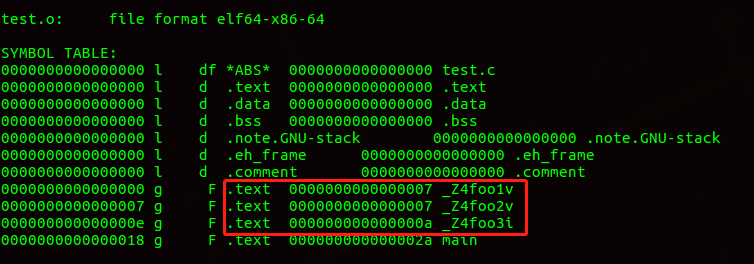

你真的知道C语言里extern C有什么作用吗
描述
我经常在C语言的头文件中看到下面的代码:
#ifdef __cplusplus extern “C” { #endif // all of your legacy C code here #ifdef __cplusplus } #endif
这通常用于C++和C混合编程的时候,为了防止C++的编译器在编译C文件的时候出现错误;
众所周知,C++可以进行函数名重载,但是C则没有这种功能,那这和extern “C”又有什么关系呢?
先看下面这个表格,如下所示;
| 语言 | 描述 |
|---|---|
| C | 函数名可以作为唯一ID和代码段的程序建立联系 |
| C++ | 因为重载的关系,函数名符号会被破坏,从而会根据函数的参数不同而重新生成函数符号 |
未添加 extern “C”
test.h
#ifndef TEST_H #define TEST_H void foo1(void); void foo2(void); void foo3(int i); #endif
test.c
void foo1(void){} void foo2(void) {} void foo3(int i){} int main(int argc,char** argv){ foo1(); foo2(); foo3(1); return 0; }
编译这两个文件,生成test.o文件,通过objdump查看函数符号;
g++ -c test.c test.h objdump -t test.o
可以看到函数符号已经被编译器修改了;

添加extern “C”
test.h
#ifndef TEST_H #define TEST_H #ifdef __cplusplus extern “C” { #endif void foo1(void); void foo2(void); void foo3(int i); #ifdef __cplusplus } #endif #endif
test.c
#ifdef __cplusplus extern “C” { #endif void foo1(void){} void foo2(void) {} void foo3(int i){} #ifdef __cplusplus } #endif int main(int argc,char** argv){ foo1(); foo2(); foo3(1); return 0; }
编译这两个文件,生成test.o文件,通过objdump查看函数符号;
g++ -c test.c test.h objdump -t test.o
这时候函数符号是正确的;

extern “C” 是告诉C++的编译器不要打我这些C函数的主意。
好了,这次分享的比较简单,也挺实用,我们下期再见。
END
作者:菜刀和小麦
来源:小麦大叔
版权归原作者所有,如有侵权,请联系删除。
编辑:jq
-
请问C语言extern通常怎么使用?2023-10-08 506
-
【Linux+C语言】你真的了解system接口的调用吗?2022-09-12 5290
-
C语言里函数的定义、子函数的使用及变量的作用域2022-04-28 8043
-
你真的都懂C语言吗2021-12-21 1381
-
C语言中的extern2021-11-02 2952
-
C语言代码中的extern2021-09-02 2817
-
C++语言里有哪些比较常见的坑?2021-05-20 2613
-
C语言里extern "C" 是什么意思?2020-09-07 7423
-
单片机C语言和C语言为什么有差异?2020-09-01 4151
-
C语言编程入门的必做题你知道吗2019-11-05 1119
-
C语言的运行环境有哪些_哪些是值得推荐的_C语言常用开发环境详解2018-02-01 109532
-
C语言static和extern使用方法的介绍2017-11-21 1077
-
我们用C语言写单片机,可是你真的懂C语言么2016-09-27 5592
-
你必须知道的495个C语言问题2016-06-27 882
全部0条评论

快来发表一下你的评论吧 !

